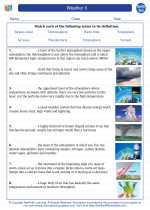Condensation
Condensation is the process by which water vapor in the atmosphere is converted into liquid water. This occurs when the air becomes saturated with water vapor, usually due to a drop in temperature or an increase in the amount of water vapor present. This can happen in a variety of ways, such as through the cooling of air, contact with a cold surface, or mixing with air of a different temperature.
Factors affecting condensation
- Temperature: As air cools, it loses its capacity to hold water vapor, leading to condensation.
- Humidity: Higher humidity levels make it more likely for condensation to occur, as the air is closer to saturation.
- Surface area: Condensation is more likely to occur on surfaces with a large surface area, such as windows or blades of grass.
- Nuclei: Condensation nuclei, such as dust or pollutants, can provide a surface for water vapor to condense onto, forming clouds or fog.
Examples of condensation
Condensation can be observed in various natural phenomena, including the formation of dew on grass in the early morning, the creation of clouds in the atmosphere, and the fog that forms when warm, moist air comes into contact with a cold surface.
Study Guide
- Define condensation and explain the process by which it occurs.
- Discuss the factors that affect condensation, including temperature, humidity, surface area, and condensation nuclei.
- Provide examples of condensation in nature and how it manifests in everyday life.
- Explain the role of condensation in the water cycle and its importance for the Earth's climate and ecosystems.
- Discuss how condensation is related to other atmospheric processes, such as evaporation, precipitation, and cloud formation.
Understanding condensation is essential for comprehending the water cycle, weather patterns, and climate processes. It also plays a crucial role in various human activities, such as agriculture, water resource management, and building maintenance.
[Condensation] Related Worksheets and Study Guides:
.◂Earth Science Worksheets and Study Guides High School. Weather II
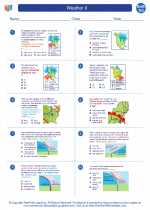
 Worksheet/Answer key
Worksheet/Answer key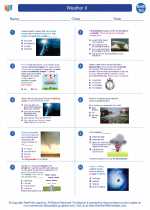
 Worksheet/Answer key
Worksheet/Answer key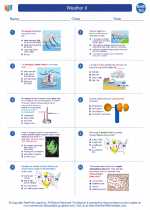
 Vocabulary/Answer key
Vocabulary/Answer key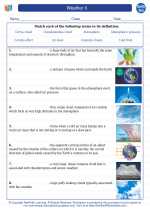
 Vocabulary/Answer key
Vocabulary/Answer key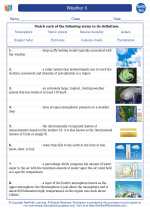
 Vocabulary/Answer key
Vocabulary/Answer key